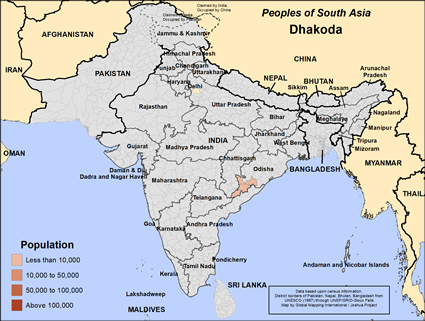The Dhakoda people have a long history in India, particularly in the central and eastern regions. Traditionally, they have engaged in agriculture and local crafts. The Dhakoda primarily speak regional languages such as Hindi and Odia.
Today, the Dhakoda people live in rural villages, focusing on farming and small-scale crafts. They cultivate crops such as rice, wheat, and vegetables and many families also engage in pottery and weaving. Their communities are close-knit, emphasizing strong family bonds and mutual support. The Dhakoda maintain a vibrant cultural life with local festivals, music and traditional arts.
Their diet is primarily based on vegetarian foods such as rice, lentils, vegetables and a variety of spices. They also enjoy traditional sweets and festive foods during celebrations. Their culinary practices emphasize simplicity, nutrition, and the use of locally available ingredients.
Their wedding practices are elaborate and rooted in Hindu traditions. Weddings typically include Hindu rituals such as the exchange of garlands, sacred fire ceremonies, and music and dance performances.
The Dhakoda people practice Hinduism, worshiping various deities and observing numerous religious rituals and festivals such as Diwali, Holi, and Makar Sankranti. Their belief system emphasizes values like dharma (duty), karma (actions and consequences), and ahimsa (non-violence). They honor their ancestors through rituals and ceremonies, ensuring the transmission of their religious and cultural traditions across generations.
The Dhakoda people need better access to quality education to provide more opportunities for their children. Improved healthcare services are essential due to the limited availability of medical facilities and high rates of preventable diseases. Economic support through modern agricultural techniques, market access, and vocational training can enhance their livelihoods. Infrastructure development, including better roads, clean water supplies, and reliable electricity, will greatly benefit the Dhakoda community. Addressing these needs will help the Dhakoda people achieve greater socio-economic stability while preserving their rich cultural and religious heritage.
Pray for a "Book of Acts" type of movement to Christ among the Dhakoda people.
Pray for the Dhakoda people to understand and embrace that Jesus wants to bless their families and neighborhoods.
Pray for Holy Spirit anointed believers from the Dhakoda people to change their society from within.
Pray for a movement in which the Holy Spirit leads and empowers disciples to make more disciples.
Pray for a movement of Jesus to heal and strengthen Dhakoda communities.
Scripture Prayers for the Dhakoda in India.
Cultural Traditions of India, Ministry of Culture, Government of India, 2017.
Sharma, B.K., "Agricultural Practices in Central and Eastern India," Mittal Publications, 2012.
"Rural Development in India," Ministry of Rural Development, Government
| Profile Source: Joshua Project |











